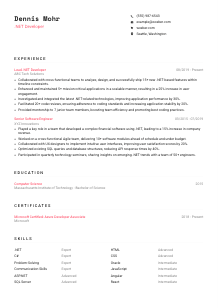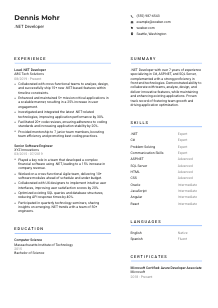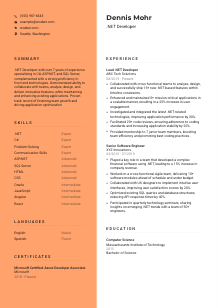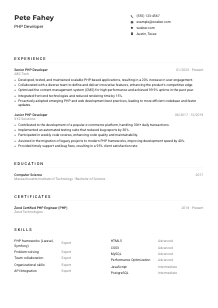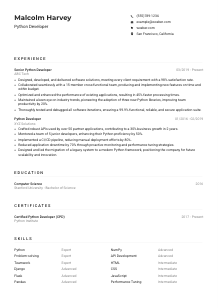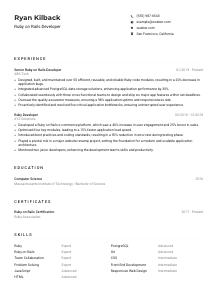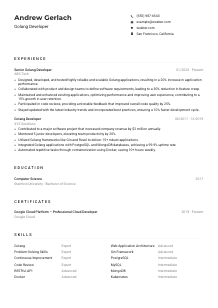.NET Developer Resume Example
Coding in C#, but your resume lacks precision? Delve into this .NET Developer resume example, constructed using Wozber free resume builder. Learn how to encapsulate your .NET skills to align with the job prerequisites, writing a career journey that executes as flawlessly as your applications!
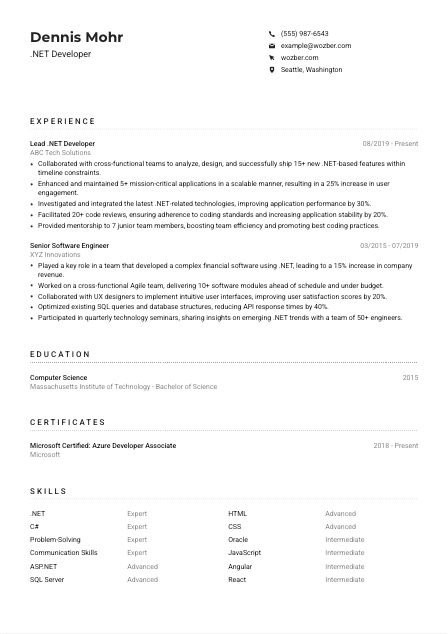
How to write a .NET Developer Resume?
Hello, aspiring .NET Developer! The path to securing your dream job in the fast-paced world of .NET development is paved with meticulous resume crafting. It's not just about listing your experiences and skills; it's about storytelling, about carving your professional journey into a narrative that speaks volumes to hiring managers. Fear not, for this guide will walk you through each step of aligning your resume with your dream job's requirements, leveraging the unparalleled features of Wozber free resume builder.
Ready to make your resume not just a document, but a ticket to your .NET Developer career? Let's dive in!
Personal Details
The 'Personal Details' section might seem like the simplest part of your resume, but it's your first opportunity to make an impression. Let's unravel the art of tailoring this section for the .NET Developer position, ensuring every detail plays its part in aligning you with your targeted role.
1. Brand Yourself
Think of your name as your personal brand. It's the first thing a potential employer will see, so make it impactful. Use a legible font, maybe a notch bigger than the rest to ensure it catches the eye. This is the beginning of your story; make it memorable.
2. Job Title Alignment
Place the job title directly under your name, matching the role you're applying for. Seeing ".NET Developer" immediately shows the hiring manager that your resume is tailored and you are serious about this specific position. It's about setting the stage right from the start.
3. Essential Contact Info
In this digital age, your contact information must include your phone number and a professional email. Consider a format like firstname.lastname@email.com for your email. It's simple, professional, and easy to remember.
4. Location Matters
Since the job specifies "Must be located in Seattle, Washington," clearly stating your location in Seattle can give you an advantage. It tells your potential employer you're exactly where they need you to be, cutting down on relocation hurdles.
5. The Power of a Professional Profile
If you have a LinkedIn profile or a personal website showcasing your portfolio, include it. Just ensure they're well-maintained and reflect the same professionalism as your resume. It's an opportunity to provide a deeper insight into your capabilities.
Takeaway
Your 'Personal Details' section is more than a formality; it's your resume's handshake. Keep it professional, precise, and tailored to your targeted role. This is your first chance to make a strong impression, so ensure every detail adds to your narrative.





Experience
The 'Experience' section is where you get to shine. For a .NET Developer, it's not just about listing jobs you've had; it's about presenting a story of growth, collaboration, and technical prowess. Let's strategize on sculpting your experience to mirror the precise demands of your desired role.
- Collaborated with cross‑functional teams to analyze, design, and successfully ship 15+ new .NET‑based features within timeline constraints.
- Enhanced and maintained 5+ mission‑critical applications in a scalable manner, resulting in a 25% increase in user engagement.
- Investigated and integrated the latest .NET‑related technologies, improving application performance by 30%.
- Facilitated 20+ code reviews, ensuring adherence to coding standards and increasing application stability by 20%.
- Provided mentorship to 7 junior team members, boosting team efficiency and promoting best coding practices.
- Played a key role in a team that developed a complex financial software using .NET, leading to a 15% increase in company revenue.
- Worked on a cross‑functional Agile team, delivering 10+ software modules ahead of schedule and under budget.
- Collaborated with UX designers to implement intuitive user interfaces, improving user satisfaction scores by 20%.
- Optimized existing SQL queries and database structures, reducing API response times by 40%.
- Participated in quarterly technology seminars, sharing insights on emerging .NET trends with a team of 50+ engineers.
1. Dissect the Job Description
Begin by extracting key phrases from the job description, like "collaborate with cross-functional teams" or "maintain and enhance existing applications." These are not just requirements; they're clues to what your potential employer values most.
2. Structure with Strategy
Organize your experience chronologically, starting with the most recent. For each position, include your title, company name, and dates of employment. This layout not only presents your career progression logically but also makes it easier for the ATS to scan.
3. Accomplishments that Resonate
For every role, focusing on accomplishments rather than just duties can set you apart. Use the job description as a guide. For instance, "investigated and integrated the latest .NET-related technologies, improving application performance by 30%" directly addresses the desire for someone who 'investigates and develops skills in emerging .NET-related technologies.'
4. Numbers Speak Louder
Quantifying your achievements can significantly impact your resume's effectiveness. Saying "improved application performance by 30%" provides tangible evidence of your contributions and ability to make a real difference.
5. Relevance is Key
It's tempting to list all your achievements, but focus on those most relevant to the .NET Developer position. This isn't just about meeting ATS criteria; it's about making it crystal clear to the hiring manager why you're the perfect fit.
Takeaway
Your experience section is the core of your resume. It's where you showcase not just your qualifications, but your ability to excel in the role you're targeting. Make every word count, align every achievement with the job requirements, and let your professional journey shine.
Education
While 'Education' might seem like a straight-forward section, for a transforming field like .NET development, how you present your academic background can subtly underscore your readiness for the role. Let's look at how to position your education as a solid foundation for your .NET Developer aspirations.
1. Identify Key Requirements
While our job description didn't specify educational requirements, it's essential to thoroughly review and match any mentioned criteria. For example, a "Bachelor of Science in Computer Science" directly aligns with the expectations for a .NET Developer.
2. Simplicity Sells
Keep your education section clear and straightforward. List your degree, field of study, institution, and graduation year. This succinct format ensures that the information is easily digestible and ATS-friendly.
3. Tailor Your Degree
If your degree directly relates to the role, make it prominent. While not explicitly required for every .NET Developer position, a relevant degree can significantly enhance your resume's appeal.
4. Courses That Count
In some cases, highlighting specific courses can underline your expertise and dedication to the field. If relevant, note coursework that aligns with the skills and knowledge required for a .NET Developer role.
5. Celebrate Achievements
Any honors, clubs, or projects that showcase skills relevant to a .NET Developer role can add depth to your application. Especially for entry-level candidates, these details can highlight potential and commitment to the field.
Takeaway
Craft your education section to reflect not just a list of degrees but a story of a dedicated, evolving professional. Whether it's your major, relevant coursework, or academic achievements, let every element serve your narrative as a capable and motivated .NET Developer.
Certificates
In the realm of .NET development, certifications can markedly strengthen your resume by highlighting your commitment to continuous learning and mastery of specific skills. Here's how to ensure your certificates section bolsters your candidacy for the .NET Developer role.
1. Match the Role
Start by reviewing the job description for any preferred certifications. Including certifications like 'Microsoft Certified: Azure Developer Associate' directly aligns with the role's expectations, underscoring your expertise and dedication.
2. Quality over Quantity
Rather than listing every certification you've earned, focus on those most relevant to a .NET Developer position. This selectivity ensures your resume is targeted and concise, making it more impactful.
3. Dates Matter
Including the date of certification (or expiration if applicable) is crucial, especially in technology fields where staying up-to-date is key. This transparency shows prospective employers that your skills are current.
4. Stay Proactive
The tech industry evolves rapidly, and so should you. Continually seek out new certifications and learning opportunities relevant to .NET development. This commitment to growth is a valuable trait to employers.
Takeaway
Choosing which certifications to include on your resume is about more than listing qualifications—it's about telling a story of ongoing development and readiness for the challenges of a .NET Developer role. Highlight certifications that reflect this narrative and watch your resume stand out.
Skills
The 'Skills' section is a distilled showcase of your professional capabilities. For a .NET Developer, this is where technical prowess meets problem-solving acuity. Let's tailor this section to mirror the exact skills sought in your dream job's description.
1. Skill Extraction
Review the job description and note both explicitly stated and implied skills. For a .NET Developer role, like the one we're focusing on, pertinent skills might include .NET, C#, ASP.NET, SQL Server, and problem-solving.
2. Direct Matching
Link your skills with those mentioned in the job description. Demonstrating expertise in required skills like .NET and C# positions you as a strong candidate. Don't forget to also include soft skills, such as communication abilities, crucial for collaborative environments.
3. Organized Display
Organize your skills section for easy readability. Consider categorizing them into 'Technical Skills' and 'Soft Skills' to provide a clear snapshot of your capabilities to hiring managers and the ATS alike.
Takeaway
Your skills section is a compelling advertisement of your professional abilities. Let each skill you list be a testament to your suitability for the .NET Developer role. Be selective, matching your skills with job requirements, and present them in an organized manner. It's your chance to make an impression that you're not just a candidate, but the candidate.
Languages
In the global arena of technology, language proficiency can be a unique asset, underscoring your ability to collaborate on diverse teams or serve varied markets. For a .NET Developer, this section can highlight your versatility and adaptability.
1. Requirement Review
The job demands 'Proficiency in English communication.' Start by listing English, stating your proficiency level. This meets a critical requirement head-on, affirming your ability to communicate effectively in the workplace.
2. Additional Languages
Listing other languages you're proficient in can set you apart, especially if the role involves international teams or clients. Each additional language is a testament to your ability to navigate a global professional environment.
3. Honesty in Proficiency
Be precise about your language proficiency levels, using terms like 'Native,' 'Fluent,' 'Intermediate,' and 'Basic.' This clarity provides a realistic view of your communication skills, critical for roles requiring teamwork and client interfacing.
4. The Role's Scope
Consider the broader scope of the .NET Developer role. If it involves working in a global context, your multilingual abilities become significantly more valuable, underscoring your readiness for a connected world.
Takeaway
While your programming skills are paramount, don't underestimate the value of language proficiencies in a .NET Developer role. They're markers of your ability to engage with a broader audience, offering a distinct advantage in our interconnected world. Let this section speak to your global potential.
Summary
Your 'Summary' section is akin to an elevator pitch—brief, engaging, and powerful. For a .NET Developer, it's your chance to frame your narrative, encapsulating your experience, skills, and the unique value you bring to the table in a few impactful lines.
1. Essence of the Job
Absorb the essence of the job description to understand deeply what the employer is seeking. This insight will guide you in emphasizing your most relevant .NET development experiences and skills.
2. Professional Introduction
Start with a statement that positions you within your profession. A powerful opener like, '.NET Developer with over 7 years of experience specializing in C#, ASP.NET, and SQL Server' immediately establishes your expertise.
3. Address Key Skills and Achievements
Highlight a mix of technical proficiencies and soft skills relevant to the .NET Developer role. Connecting these with tangible achievements proves your capability and impact, showing you're a strong fit.
4. Conciseness is Key
Remember, this is just a summary. It should entice the reader to learn more about you, not serve as your entire resume. Keep it to 3-5 lines, each one loaded with value and precision.
Takeaway
Think of your summary as the hook that captures the hiring manager's interest. By effectively bridging your skills and experiences with the .NET Developer role requirements, you position yourself as not just a candidate, but the candidate. This section sets the tone for your entire resume, so make it count.
Launch Your .NET Developer Journey
Congratulations on navigating through the tailored resume crafting process! With this expert guide and the powerful features of Wozber free resume builder at your disposal, you're well-prepared to create an ATS-compliant resume that not only passes through the ATS resume scanner with flying colors but also resonates strongly with hiring managers. Use our ATS-friendly resume templates and ATS optimization tools to craft your resume. Let your journey to becoming a .NET Developer take a monumental leap forward.
Your dream job awaits. Be bold, be strategic, and let your resume open doors to new possibilities.

- Minimum of 3 years of experience in .NET development using C# and ASP.NET.
- Strong understanding of relational databases, preferably with proficiency in SQL Server or Oracle.
- Familiarity with front-end technologies such as HTML, CSS, and JavaScript frameworks like Angular or React.
- Proven experience with the full software development lifecycle, from design to deployment.
- Excellent problem-solving and communication skills, with the ability to work collaboratively in a team environment.
- Proficiency in English communication is a critical skill.
- Must be located in Seattle, Washington.
- Collaborate with cross-functional teams to analyze, design, and ship new features.
- Maintain and enhance existing applications in a timely and scalable manner.
- Investigate and develop skills in emerging .NET-related technologies.
- Participate in code reviews, ensuring coding standards and best practices are met.
- Provide support and guidance to junior team members, promoting knowledge transfer and growth.





